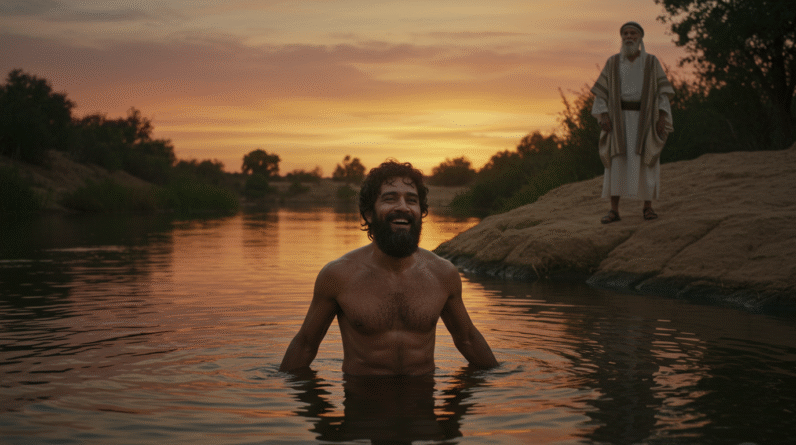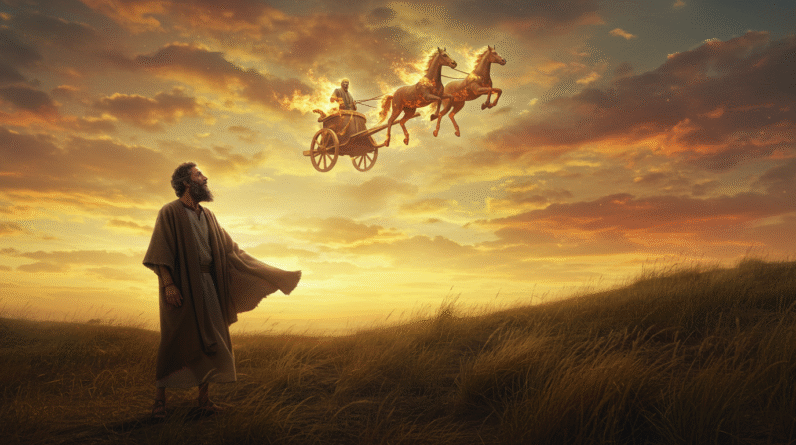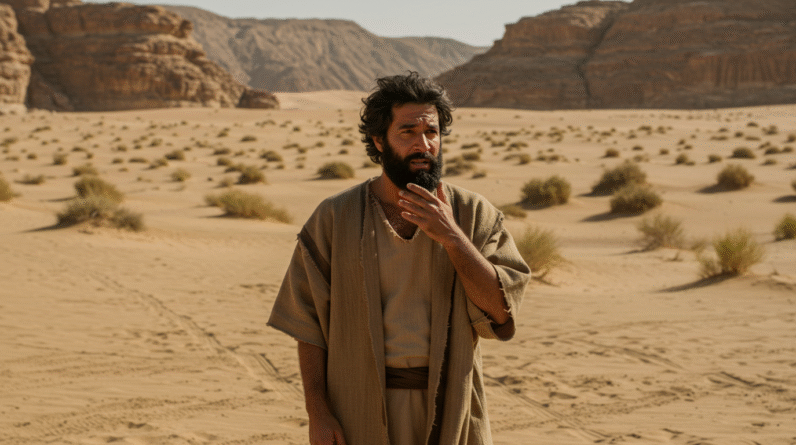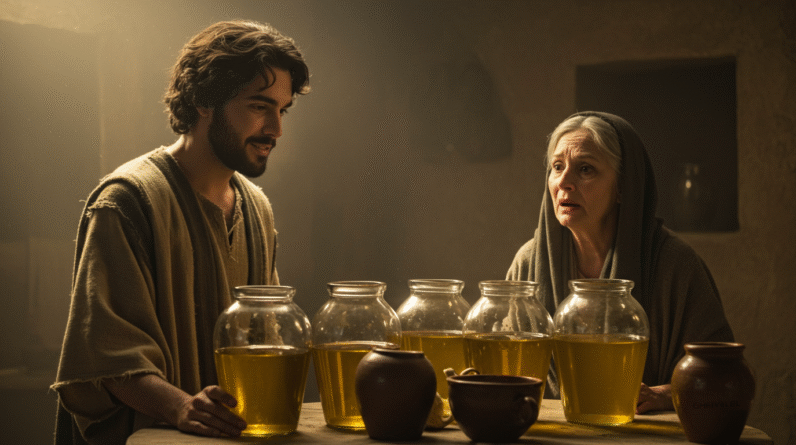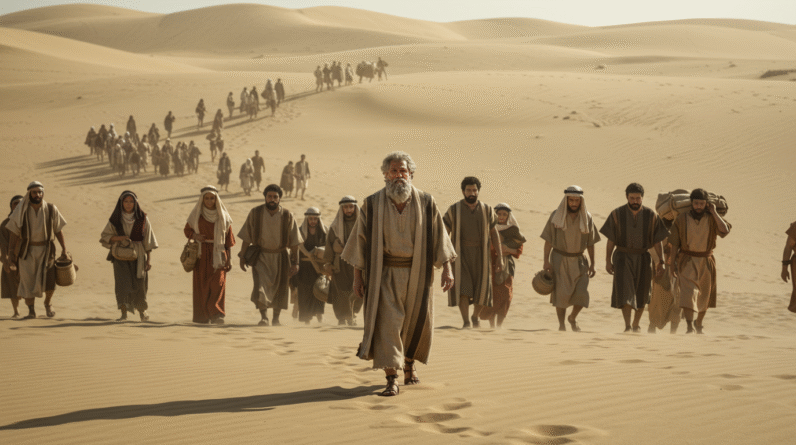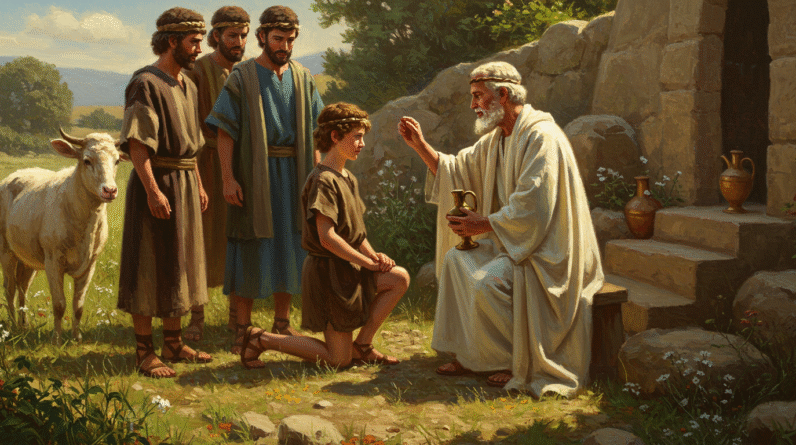Elijah And The Widow Of Zarephath – Trusting God In Scarcity
Have you ever found yourself in a situation where you just didn’t know where your next meal was coming from or how you were going to make ends meet? Imagine standing in the shoes of a woman whose pantry was down to a scant handful of flour and a dribble from a small jar of oil. This is the story of Elijah and the widow of Zarephath — a tale that takes us on a journey of trusting God in scarcity.
The Context of Scarcity
Picture the ancient land of Israel during a time of great drought, a setting that immediately introduces us to the concept of scarcity in its rawest form. Water was as rare as gold, each drop cherished with the same desperation as a desert wanderer craves an oasis. Crops wilted under the relentless sun’s gaze, and the echo of hunger became a haunting refrain in daily life.
But what’s perhaps even more striking is how this intense environment affects, not just communities, but individuals on a deeply personal level. We are invited to step into a story where survival demands faith, and faith fuels survival.
The Background of Elijah
Before we delve deeper into the interaction between Elijah and the widow of Zarephath, let’s take a step back and get to know Elijah himself. Elijah was a prophet of God, known for his directness and deep commitment to the God of Israel. His very name, meaning “My God is Yahweh,” mirrors his identity — a representative of divine will and messenger of God’s word.
Elijah was living in challenging times, with widespread worship of Baal, a direct affront to his beliefs. He was a man tasked with delivering difficult messages, like warning King Ahab of impending calamities due to the nation’s spiritual failures. Despite his prestigious calling, Elijah faced his own challenges — loneliness, danger, and at times, doubt. Yet, his life is incredibly instructive in the art of trusting amidst adversity.
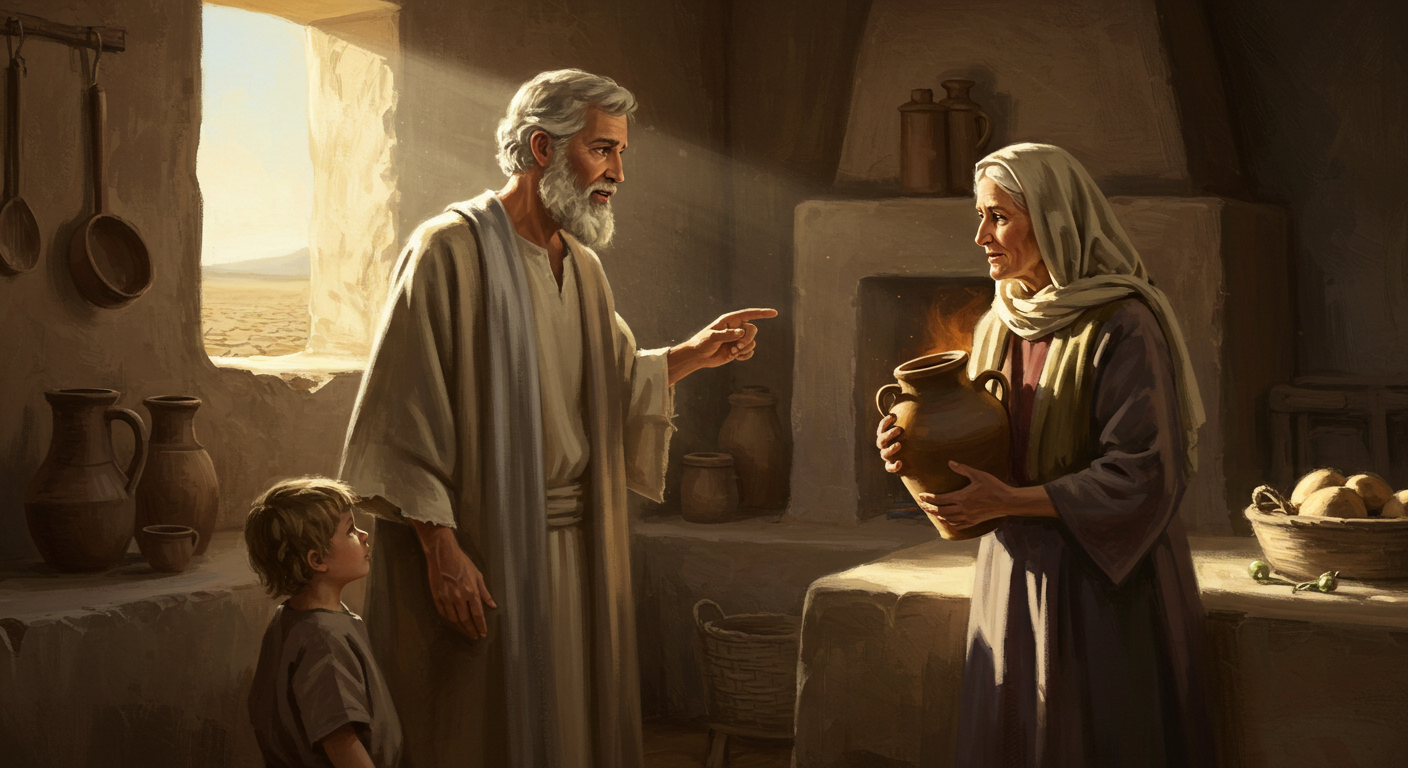
The Encounter with the Widow
In 1 Kings 17:8-16, the stage is set for a compelling encounter. God directs Elijah to Zarephath in Sidon, a region outside of Israel, to find solace with a widow. Now, if you think about it, this is quite unusual; after all, widows during these times were often the epitome of need, not providers of hospitality.
Elijah approaches a woman gathering sticks, and the interaction begins with an unusual request. He asks her to bring him some water, which in itself is a significant plea during a drought. But Elijah goes further; as she turns to fetch the water, he calls out, requesting bread too.
Here’s where we meet the widow at her own point of desperation. Her response is raw and revealing: she doesn’t deny her lack, explaining that she’s preparing her last meal for herself and her son with what little remains. Her voice trembles with the weight of finality, though unspoken, is clear — this is the end.
Trusting in a Promise
What happens next is an extraordinary display of faith, with 1 Kings 17:14 standing as a cornerstone: “For this is what the Lord, the God of Israel, says: ‘The jar of flour will not be used up and the jug of oil will not run dry until the day the Lord sends rain on the land.’”
Elijah’s pronouncement is bold, encapsulating a divine promise — a promise that demands faith both from the giver and the receiver. Trust becomes the currency of the transaction. Imagine the widow’s heart as she weighs Elijah’s words against her reality. Faith must overcome fear, hope must rise above despair. The widow’s choice is both simple and profound: trust in God’s provision.
Provision in the Midst of Famine
The incredible unfolds as the widow decides to trust. Every day, she discovers the fulfillment of Elijah’s words — her jar of flour stays full, her jug of oil remains steadfastly unyielded. Is it not remarkable how nourishment springs forth in a setting defined by dearth? The widow of Zarephath becomes a living testament to trusting God deeply.
In the heart of famine, this miracle isn’t just about physical sustenance. It speaks to the soul’s sustenance, challenging us to explore what it means to rely on something greater than ourselves when the well seems dry. It breathes life into the concept of abundance amidst absence, where daily bread — both literal and spiritual — is provided.
Lessons in Divine Timing
Something significant we can glean here is the lesson of divine timing. Elijah arrives in Zarephath at just the right moment, not a day too soon nor a moment too late. Isn’t it interesting how divine intervention often aligns with our deepest moments of need? God’s timing is an enigmatic yet ever-present thread woven throughout this narrative.
This teaches us that often, God’s answers aren’t found in our schedules or timelines. The widow could have easily dismissed Elijah’s strange proposal, tethered as she was to the constraints of her own understanding and resources. Instead, she stepped into a divine timeline and found unending provision.
The Faith It Takes
Reflecting on the faith it takes to trust in scarcity, Elijah and the widow of Zarephath encourage courage in the face of overwhelming odds. Do you ever wonder if you could do the same? It’s a valid question in light of how daunting it can be to trust in what you cannot see or touch.
Faith, at its core, is the willingness to believe beyond the evidence before us. It coaxes us forward with a whisper that there is something more, even when the facts say otherwise. Ultimately, trust is a choice — one that can be transformative when rooted in the soil of divine promises.
Trust Beyond Material Bounds
There is a deeper aspect to this narrative that beckons exploration — the idea that trust transcends mere physical sustenance. The widow of Zarephath didn’t just receive food; she became part of a greater narrative that pointed to God’s faithfulness and provision. Her story intertwines her with a series of miracles that cannot be measured in loaves or oil drops alone.
As you consider your own life, where does your trust lie? Trusting beyond material bounds challenges us to view our life’s situations as more than mere physical reality. Instead, it suggests immersion in a deeper, more nuanced tapestry of divine care and purpose.
A Modern Application of Trust
Fast forward to our world today, where scarcity takes on myriad forms — from financial strain to emotional and spiritual drought. How do we apply the lessons of Elijah and the widow of Zarephath?
Perhaps the first step is acknowledgment — admitting our need and recognizing our limitations. Imagine the freedom of letting go, of releasing the burden of trying to control the narrative. What if, like the widow, you embraced trust rather than holding tight to what little you have?
Modern scarcity demands innovative faith, a willingness to rise above statistics and fear with the hopeful acknowledgment that divine provision is at work, albeit sometimes unseen.
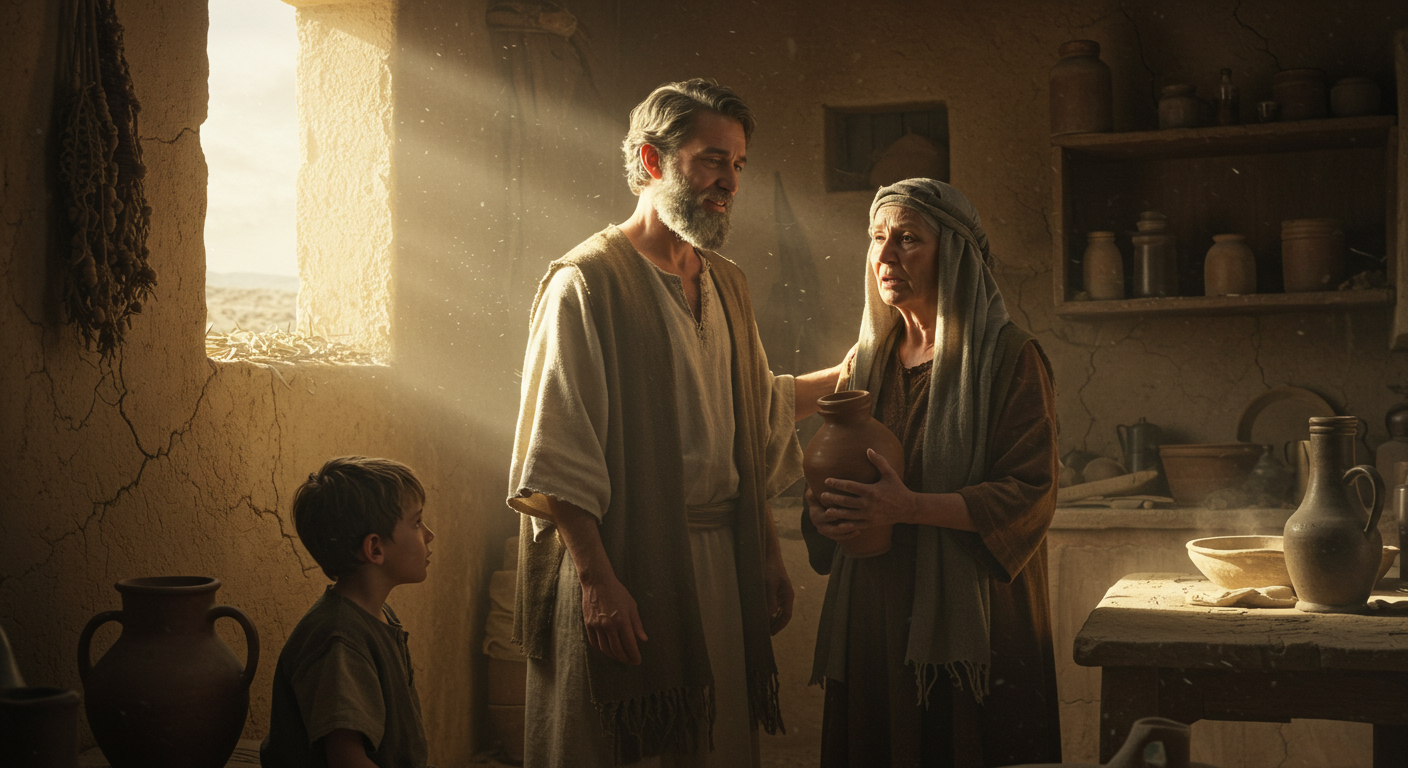
Embracing Uncertainty with Hope
As you navigate life’s uncertainties, take heart from the journey of Elijah and the widow. Theirs is a story of hope framed within a backdrop of what appeared to be hopelessness. You’re invited to embrace your own uncertainties, tempered with the assurance of divine presence, knowing that sometimes, our last jar of flour and humble jug of oil is precisely where miracles are born.
These moments might look different today, but the heart of the message remains untouched: Trust is transformative. It frees, it provides, and most importantly, it aligns with a reality greater than our current understanding.
Finding Abundance in the Shadow of Lack
Imagine a world where scarcity doesn’t define you, where lack doesn’t dictate the terms of your hope. Through the eyes of Elijah and the widow of Zarephath, you can glimpse the possibility of abundance even when the shadow of lack looms large.
This abundance might not manifest in ways that are immediately tangible or material. Often, it manifests in contentment, peace, and the assurance of being held in a grander narrative than we can conceive. Shift your focus from what’s lacking to what is enduring and divine in nature.
A Story of Resilience and Courage
The story of Elijah and the widow of Zarephath is one of resilience and courage. It’s about stepping out boldly in trust, daring to believe in something beyond the visible. It’s about acknowledging your fears while also embracing divine assurances.
Theirs is a call to action in our own narratives. You are invited to weave resilience into the fabric of your journey, drawing courage from those who have gone before. What story of resilience and courage will you choose to write in the midst of today’s uncertainties?
A God Who Provides
Above all, Elijah and the widow of Zarephath testify to the character of a providing God. Sometimes provision comes in unexpected forms, disguised beneath layers of everydayness, or wrapped in simple miracles. Will you choose to see it, even amidst a backdrop of scarcity?
As you continue on your life’s path, let the commingled faith and trust of Elijah and the widow inspire you. Let them remind you of a God who knows no boundaries when it comes to care and provision, always ready to step into your narrative with grace and abundance.
Explore More
For further reading and encouragement, check out these posts:
👉 7 Bible Verses About Faith in Hard Times
👉 Job’s Faith: What We Can Learn From His Trials
👉 How To Trust God When Everything Falls Apart
👉 Why God Allows Suffering – A Biblical Perspective
👉 Faith Over Fear: How To Stand Strong In Uncertain Seasons
👉 How To Encourage Someone Struggling With Their Faith
👉 5 Prayers for Strength When You’re Feeling Weak

📘 Jesus and the Woman Caught in Adultery – Grace and Mercy Over Judgement
A powerful retelling of John 8:1-11. This book brings to life the depth of forgiveness, mercy, and God’s unwavering love.
👉 Check it now on Amazon
As a ClickBank Affiliate, I earn from qualifying purchases.
Acknowledgment: All Bible verses referenced in this article were accessed via Bible Gateway (or Bible Hub).
“Want to explore more? Check out our latest post on Why Jesus? and discover the life-changing truth of the Gospel!”



